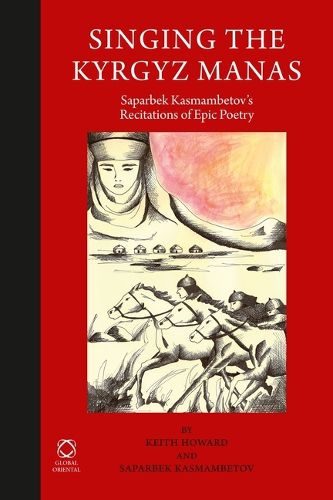Readings Newsletter
Become a Readings Member to make your shopping experience even easier.
Sign in or sign up for free!
You’re not far away from qualifying for FREE standard shipping within Australia
You’ve qualified for FREE standard shipping within Australia
The cart is loading…






Today, the Kyrgyz Manas is one of the most celebrated epic heroic poems in the world. At the turn of the new millennium it was appointed a UNESCO ‘Masterpiece in the Oral and Intangible Heritage of Mankind’, signalling its global significance. It sits alongside Homer’s Iliad and Odyssey, or the South Asian Mahabharata and Ramayana, although politics and language have during the twentieth century conspired against allowing it to become as well known. In contrast to previously published material, this book focuses on one septegenarian contemporary performer, Saparbek Kasmambetov who inherited the oral tradition of his culture, adding details and other elements to his storytelling, as he saw fit. Consequently, the volume does not offer a literal translation in poetic form, but is presented as a story - as originally intended; the contextual/historical account situates Soviet/Kyrgyz with Western accounts of Manas and other epic heroic poetry. Part I offers a translation of seven episodes from the Manas, as sung by Saparbek, with accompanying CDs - the translations of all the episodes being based on the recordings. Part II comprises three chapters examining oral epic poetry and the Manas; the Kyrgyz Manas recorded, performed and studies; finally, a study of Saparbek Kasmambetov - the performer.
The accompanying plates are the work of Gouljan Arslan, Saparbek Kasmambetov’s granddaughter.
$9.00 standard shipping within Australia
FREE standard shipping within Australia for orders over $100.00
Express & International shipping calculated at checkout
Today, the Kyrgyz Manas is one of the most celebrated epic heroic poems in the world. At the turn of the new millennium it was appointed a UNESCO ‘Masterpiece in the Oral and Intangible Heritage of Mankind’, signalling its global significance. It sits alongside Homer’s Iliad and Odyssey, or the South Asian Mahabharata and Ramayana, although politics and language have during the twentieth century conspired against allowing it to become as well known. In contrast to previously published material, this book focuses on one septegenarian contemporary performer, Saparbek Kasmambetov who inherited the oral tradition of his culture, adding details and other elements to his storytelling, as he saw fit. Consequently, the volume does not offer a literal translation in poetic form, but is presented as a story - as originally intended; the contextual/historical account situates Soviet/Kyrgyz with Western accounts of Manas and other epic heroic poetry. Part I offers a translation of seven episodes from the Manas, as sung by Saparbek, with accompanying CDs - the translations of all the episodes being based on the recordings. Part II comprises three chapters examining oral epic poetry and the Manas; the Kyrgyz Manas recorded, performed and studies; finally, a study of Saparbek Kasmambetov - the performer.
The accompanying plates are the work of Gouljan Arslan, Saparbek Kasmambetov’s granddaughter.